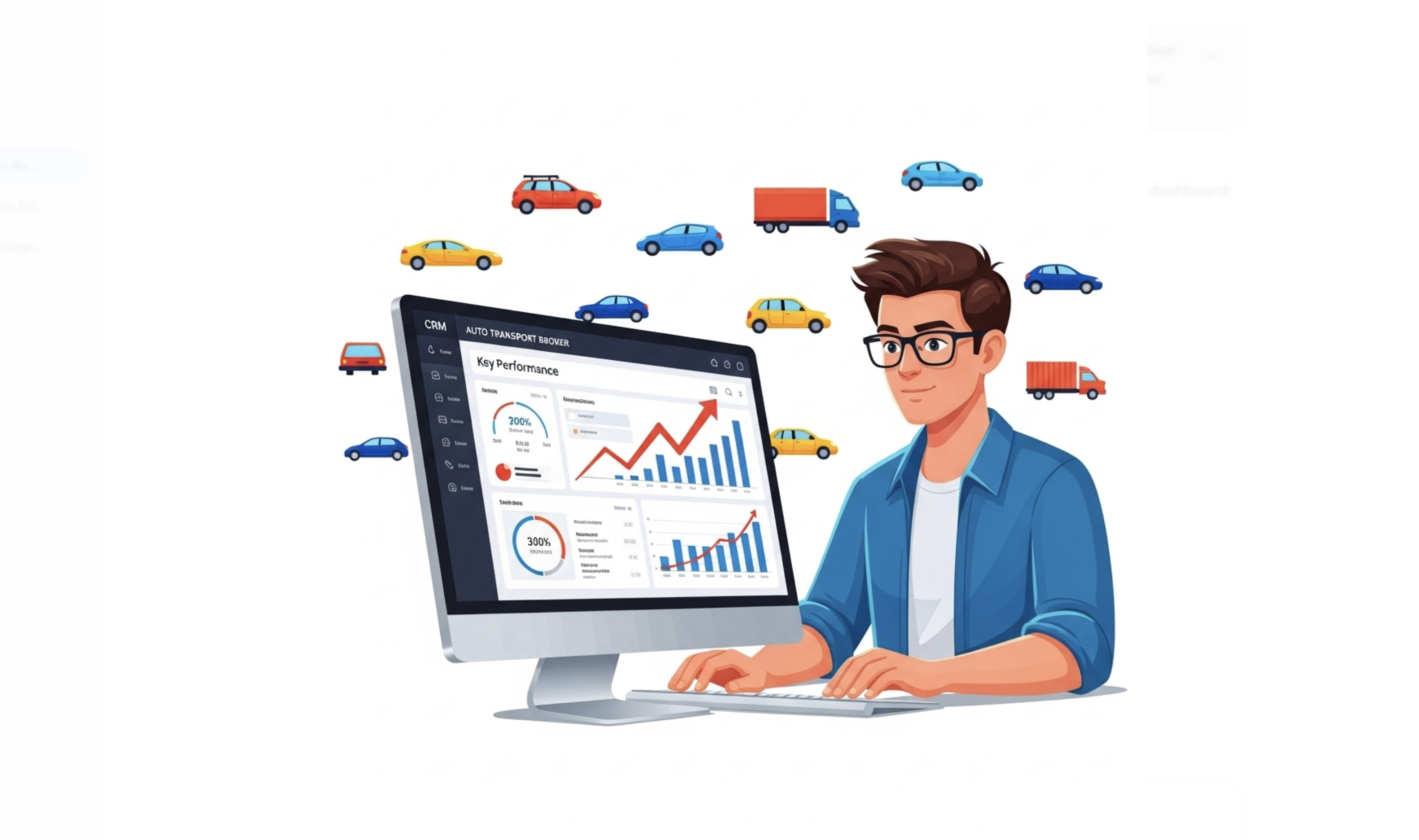
How Auto Transport Brokers Can Benefit from Using CRM to Drive Sales
Introduction: The Power of CRM for Auto Transport Sales
Imagine being able to close 30% more deals just by changing one tool in your workflow. For auto transport brokers, who often juggle dozens of leads, quotes, and customer requests each day, missing a follow-up or losing track of a shipper’s info can mean losing out on business. This is where a Customer Relationship Management (CRM) system makes all the difference. A CRM acts as a digital command center for your brokerage – organizing contacts, tracking every interaction, and automating routine tasks – so you can focus on driving sales.
In this article, we promise to show you how the use of CRM system software can transform your auto transport business. You'll learn the concrete benefits of using CRM in the vehicle shipping industry, get answers to common questions, and walk away with actionable tips to boost your sales pipeline. By the end, you’ll see why top brokers rely on CRM tools to stay ahead, and how you can leverage an auto transport CRM to capture more leads and close more deals in 2025 and beyond.
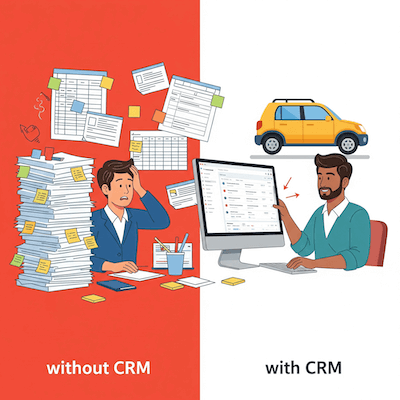
Why Auto Transport Brokers Need a CRM to Drive Sales
Auto transport brokerage is a fast-paced, competitive business. Potential customers often request quotes from multiple brokers, and the job frequently goes to whoever responds first and follows up best. Managing all those leads, quotes, carrier arrangements, and client communications by memory or spreadsheets can feel like herding cats. If you’re relying on sticky notes or standalone tools, chances are some inquiries are slipping through the cracks. Every missed phone call or forgotten email is a lost sale.
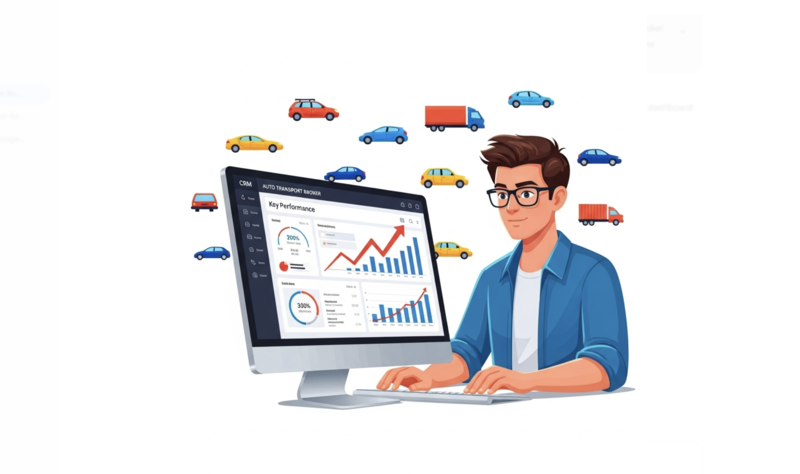
A CRM system is a game-changer because it brings order to this chaos. It centralizes all your customer and prospect information in one place and streamlines your workflow. 91% of companies with over 10 employees now use some form of CRM softwarelinkpoint360.com, and it’s no surprise – 70% of sales reps say that using a CRM helps them close more deals. In the auto transport industry, where timing and customer service are critical, a CRM enables brokers to respond faster, stay organized, and build better relationships with shippers and carriers.
Consider a quick example: Before using a CRM, a broker might manually record incoming leads from online quote forms, scribble follow-up reminders on paper, and try to remember which carrier was assigned to which shipment. Important details can be missed, leading to duplicate efforts or unhappy customers. After implementing a CRM, that same broker gets an alert on their phone the moment a new lead comes in, automatically emails the prospect a quote, and sees a dashboard of all active shipments with their assigned carriers. Nothing gets overlooked. In short, the use of CRM system tools is no longer a luxury for auto transport brokers – it’s a necessity to stay competitive and keep sales flowing.
What is an Auto Transport CRM?
A CRM (Customer Relationship Management) system is software designed to manage your contacts, leads, and interactions. But an auto transport CRM is more than a generic CRM – it’s built specifically for the vehicle shipping business. This means it understands the unique workflow of auto transport brokers and includes features tailored to your needs.
Instead of a one-size-fits-all solution, an auto transport CRM typically integrates with the tools and platforms you use every day in this industry. For example, it might connect directly with popular load boards and transportation management systems (TMS), so you can manage quotes and dispatch within one interface. It may have a built-in car shipping calculator for quotes, fields for vehicle details (make, model, VIN), and scheduling tools for pickups and deliveries. In other words, it speaks the language of auto transport.
By choosing a CRM made for auto transport brokers, you get a system that fits like a glove, reducing double-entry and manual work. A specialized platform can automatically match loads with carriers and even update shipment statuses for you. Imagine receiving a new lead, converting it to a booking, dispatching it to a carrier, and sending the customer a tracking link – all within the same software. That’s the convenience a targeted auto transport CRM can offer. It’s like having a personal assistant that never sleeps, keeping track of all the moving parts of each sale and shipment.
Key takeaway: A general CRM can store your data, but a specialized auto transport CRM can run your entire operation. It combines CRM capabilities with industry-specific tools, leading to a smoother process from the first customer inquiry to the final delivery of the vehicle.
Benefits of Using CRM to Drive Sales in Auto Transport
Let’s break down the specific ways a CRM can boost your sales and improve your brokerage’s performance. Here are the top benefits auto transport brokers gain by using a CRM system:
Never Miss a Lead or Follow-Up: A CRM centralizes all your leads and sets automatic reminders for follow-ups. This means you respond to inquiries faster and nurture every prospect. Prompt follow-up is crucial – brokers who stay on top of leads convert far more prospects into customers. (It’s no wonder studies have found that implementing a CRM can increase lead conversion rates by up to 300%!)
Faster Quotes and Booking (Speed Wins Deals): In auto transport, the broker who provides a quick, accurate quote often wins the job. CRM software can automate quote generation using saved pricing formulas and past data. Many auto transport CRMs integrate with mileage calculators or databases of rates, enabling you to give a customer a shipping price in seconds. A faster quote and rapid communication give you a huge advantage in closing the sale before the customer shops around.
Streamlined Operations & Time Savings: By automating routine tasks, a CRM frees up your time to focus on closing deals. Mundane activities like sending out welcome emails, following up on quotes, or updating customers about their shipment can be handled automatically by the system. This streamlined workflow means you and your team can handle more shipments with less effort. You’ll be able to scale your business without a proportional increase in workload. Improved efficiency also reduces errors (no more forgetting a step in the process), which keeps things running smoothly.
Improved Customer Experience and Trust: CRM tools help you deliver a better experience to your clients, which in turn drives more sales through repeat business and referrals. How? By keeping all customer interactions logged, you can personalize your service. You’ll never have to ask a client twice for the same information, and you can update them proactively about their vehicle’s status. Many CRMs will send automated status updates to shippers, so they’re always “in the loop” on pick-up, transit, and delivery. This kind of transparency builds trust and satisfaction, making customers more likely to recommend your brokerage to others. (For instance, a specialized CRM can enable real-time shipment tracking and automated notifications for shippers and carriers, giving clients peace of mind and fostering loyalty.)
Data-Driven Sales Insights: A huge benefit of using a CRM is the reporting and analytics it provides. An auto transport CRM will track metrics like how many leads you get per week, your quote conversion rate, average time from quote to booking, and more. With dashboards and reports, you can spot trends and identify what’s working (and what’s not) in your sales process. For example, you might discover that one lead source (say, a particular advertising channel or referral partner) yields a much higher conversion rate than others, so you know where to focus your marketing. Or you might find that clients tend to stall after receiving a quote, indicating you should follow up more aggressively at that stage. Armed with these insights, you can refine your strategy and make smarter decisions that lead to more sales.
Higher Conversion Rates and Revenue: Ultimately, all the above benefits add up to the main goal – increasing your sales and revenue. By ensuring every lead is handled promptly and effectively, you convert more prospects into paying customers. By operating efficiently and keeping customers happy, you can handle a higher volume of business and encourage repeat bookings (for example, dealerships or commercial clients who ship vehicles regularly will return to you). A CRM essentially allows you to do more deals in less time and with better customer outcomes. It’s a recipe for growth. Companies that adopt CRM software see significant upticks in sales – one source found businesses experienced a 29% jump in sales on average after implementing a CRM. That’s a huge payoff from one change in your process.
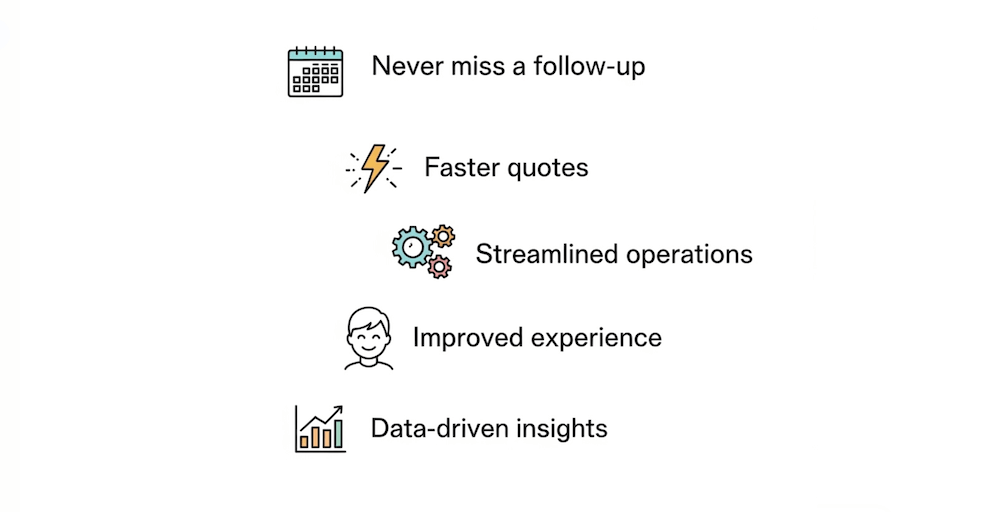
Key Features of an Auto Transport CRM that Boost Sales
Not all CRMs are created equal. Let’s look at some key features typically found in a quality auto transport CRM – and how each feature directly helps you close more deals or run your business better:
Integrated Load Board and TMS Access: An auto transport CRM often connects with load boards (like Central Dispatch or Super Dispatch) and Transport Management Systems. This means you can post and find loads, assign carriers, and manage dispatch without switching apps. The integration ensures efficient shipment matching with carriers, streamlining the process from booking to delivery. It also enables real-time shipment tracking and updates, giving you and your clients unprecedented visibility and control over each transport. When brokers, shippers, and carriers all stay informed through one system, it enhances communication and trust – which, as we noted, is great for customer satisfaction and repeat business.
Automated Quotes and Emails: Speed is key in sales. Auto transport CRMs can store your pricing parameters and automatically calculate quotes for incoming shipping requests. Some even auto-send an email or text with that quote to the lead as soon as they inquire. This instant response can impress prospects. Additionally, you can set up drip email sequences (e.g., a follow-up email 1 day after the quote, another in 3 days) to nurture leads who don’t book immediately. By automating these communications, you ensure every prospect is followed up with promptly, increasing the chances they convert to a sale.
Lead Management & Scoring: The system captures leads from your website, phone calls, emails, and even third-party lead providers, funneling them all into one dashboard. Advanced CRMs will score or prioritize leads based on criteria you set (for example, hot leads who requested an immediate pickup might be ranked higher). This helps you focus on the most promising opportunities first. No more digging through inboxes or forgetting about inquiries – the CRM will highlight what needs your attention now.
Contact and Communication Tracking: Every call, email, text, or note related to a customer is logged in the CRM. You can see the entire history of a shipper’s interactions with your brokerage at a glance. This feature means when you or a team member follows up, you have full context, which makes your communication more effective and personalized. It also prevents embarrassing slip-ups, like contacting the same customer twice from different team members, or forgetting what was discussed last time. Keeping thorough records leads to smoother relationships and more trust. In practical terms, that means happier customers who are more likely to book with you again.
Task Reminders and Calendar Integration: A good auto transport CRM will include task management – for instance, reminding you to call back a customer, check on a carrier’s insurance, or send an invoice. Many have calendar integrations so you can see all your upcoming tasks and shipment deadlines. These reminders ensure nothing falls through the cracks in your sales and delivery process. You’ll catch issues before they become problems, keeping deals on track.
Analytics Dashboard and Reporting: As mentioned earlier, having reporting tools is a huge advantage. Auto transport CRMs come with dashboards where you can monitor key performance indicators: number of quotes sent, bookings made, revenue per week, lead conversion rate, etc. They often allow you to filter by date range, source of lead, or salesperson. These analytics let you measure the impact of changes you make (for example, if you start responding to leads faster, you should see your conversion rate improve). Essentially, the CRM provides a feedback loop so you can continuously optimize your sales funnel and operations.
Mobile Access and Alerts: The best CRMs offer cloud-based access and mobile apps. As a broker, you’re not always at a desk – you might be out networking or managing pickups. With a mobile-enabled CRM, you get push notifications for new leads or important updates on your phone. You can respond to a new inquiry or update a shipment status on the go. This mobility ensures you can strike while the iron is hot – contacting a prospect within minutes, even if you’re away from the office. Being responsive helps win clients (people shipping a car appreciate quick answers and updates).
Automation & AI Assistance: Modern auto transport CRMs are increasingly incorporating AI and smart automation. This is a fresh, up-to-date development that can give you an edge. For example, some AI-driven CRM platforms can automatically engage with leads after hours. Imagine getting a new lead on a Saturday night: an AI assistant in your CRM could instantly reply with a personalized message or even a quote, instead of that customer waiting until Monday. One next-generation CRM (BeRocker) even offers automated off-hour load booking – it can secure carrier assignments for you on weekends or overnight, reportedly capturing up to 45% more loads during those off hours that would otherwise be missed. Leveraging such automation means you’re effectively selling and servicing customers 24/7. When you’re always available (through the CRM’s AI), you won’t lose potential clients to competitors just because they inquired at an odd hour. This kind of advanced feature truly sets apart brokers who adopt it, allowing them to close deals even while they sleep!
Carrier Management and Integration: Besides managing shippers (customers), an auto transport broker deals with carriers (the trucking companies or owner-operators who haul the vehicles). An industry-specific CRM often includes a carrier database where you can store carrier contacts, insurance info, lanes, and performance history. Some integrate with external carrier compliance databases or load boards to vet carriers quickly. Having this in your CRM means that when you get a new order, you can rapidly find a trusted carrier from your list and dispatch the load. Faster dispatch and reliable carriers lead to successful shipments, which in turn lead to happy customers and good reviews (all feeding back into more future sales). Additionally, integrating with your dispatch or TMS means that once a deal is closed with the customer, the execution steps (finding a carrier, sending a dispatch sheet, tracking delivery) are seamless. This one-stop integration prevents any delays in moving from sale to service.
In summary, an auto transport CRM combines powerful sales tools with operational features tailored to vehicle logistics. Each feature – from automation to integration – ultimately helps you win more business and keep customers satisfied. By picking a CRM that offers the above capabilities, you’re equipping your brokerage with a sales-driving machine.
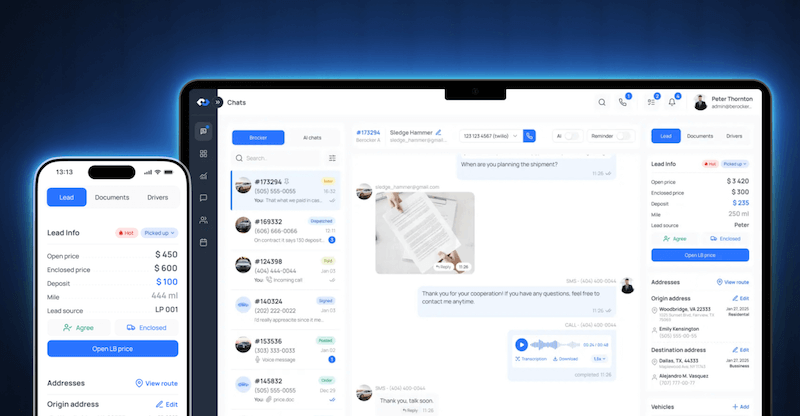
Tips to Maximize the Benefits of Your CRM System
Having a CRM is only half the battle – you also need to use it effectively to get the best results. Here are some actionable tips for auto transport brokers to fully leverage a CRM and drive sales:
Capture Every Lead into the CRM: Integrate your CRM with all lead sources (website forms, phone call tracking, load boards, email inquiries). Make it a rule that every prospect goes into the system. The more complete your database, the more opportunities you can capitalize on. No sticky notes or Excel sheets on the side – if a new shipper calls in, create a CRM entry immediately. This ensures no potential customer ever gets forgotten.
Respond Quickly (Set up Alerts): Configure real-time alerts on your CRM (via email or mobile push notifications) for new leads or important tasks. Aim to respond to new inquiries as fast as possible – ideally within minutes. A CRM can help by notifying you instantly and even auto-sending an acknowledgment or quote. Use those features. Being first to respond dramatically increases your chance of closing the deal.
Automate Follow-Ups and Reminders: Take advantage of automation workflows in your CRM. For example, set up a sequence to automatically follow up with leads who haven’t booked: a friendly email a day or two after the initial quote, a text message a few days later, etc. Also, use task reminders for manual follow-ups like phone calls. Consistent and timely follow-up is where many brokers fall short – but if you let the CRM handle the scheduling and reminding, you will stay on top of every opportunity.
Keep Your Data Organized and Updated: Clean data is key to a useful CRM. Regularly update lead statuses (e.g., mark leads as Quoted, Booked, Closed – Lost, etc., as they move through your sales pipeline). Update customer contact info and notes after each interaction. Also, maintain your carrier info and pricing tables in the system. When your CRM data is accurate and current, you can trust the reports and automations. This accuracy leads to better decision-making and no surprises when you’re trying to close a sale (for instance, you won’t accidentally call an old phone number or quote an outdated price).
Leverage CRM Analytics: Make it a habit to review your CRM’s analytics or reports regularly (weekly or monthly). Look at trends: Which marketing channel is bringing in the most leads? What’s your quote-to-booking conversion rate this month, and is it improving? Which salesperson or agent on your team is closing the most deals? Use these insights to set targets and identify areas to improve. For example, if you see that follow-up calls tend to boost conversion, you might implement a policy of calling every prospect within 24 hours of a quote. If the data shows you’re losing a lot of potential customers at the quoting stage, maybe your pricing is off, or you need to sell the value better. Data-driven tweaks will help you continuously improve your sales performance.
Integrate the CRM with Your Other Tools: If your CRM allows, connect it with your email, phone system, accounting software, or any other tools you use. For instance, logging emails or recorded calls automatically into the CRM saves time and provides a complete communication record. Integration with invoicing or payment systems can let you see in the CRM if a customer has paid, or even trigger invoice creation when a job is marked delivered. The more your CRM acts as a one-stop hub, the more efficient you’ll be. This kind of integration reduces manual data entry (which, as mentioned, cuts down errors and delays) and gives you a fuller picture of each transaction in one place.
Train Your Team and Enforce CRM Usage: A CRM is only effective if everyone uses it consistently. Take the time to train any staff or dispatchers on using the system’s features. Clearly outline your processes – e.g., “All new leads must be entered into the CRM immediately,” or “Update the load status in the CRM as soon as a carrier picks up a vehicle.” Encourage a culture of relying on the CRM rather than personal spreadsheets. You might designate a CRM champion on your team to ensure data quality and help others with questions. When your whole team is bought in, you’ll get the maximum benefit from the software, meaning a smoother operation and more sales closed thanks to no lapses in communication.
By following these tips, you’ll maximize the ROI of your CRM system. The goal is to let the CRM work for you – catching all those small details and routine tasks – so you can devote your energy to building relationships and closing deals. When used to its fullest, a CRM becomes like an extra member of your team (one that never forgets anything!).
Conclusion: Driving Sales Growth with the Right CRM
In the modern auto transport landscape, adopting a CRM is one of the smartest moves a broker can make. It’s not just about software – it’s about transforming your sales process and business operations for the better. A CRM will help you respond faster, organize your workload, keep customers happier, and ultimately close more sales. The benefits we’ve discussed – from higher lead conversion to streamlined workflows – all contribute to a healthier bottom line and a more resilient business.
Perhaps most importantly, using an auto transport CRM gives you a competitive edge. Brokers who leverage these tools can outpace those who stick to old-school methods. When you can manage leads and shipments with greater efficiency, you can handle more business and provide superior service. In an industry built on relationships and reputation, that advantage is priceless.
As you evaluate CRM options, consider the specific needs of your brokerage. Look for a solution that aligns with your workflow and offers the features that will impact your sales the most (lead management, automation, integration with transport platforms, etc.). Many brokers find that specialized platforms designed for auto transport offer the best value, since they come ready to handle the exact tasks you face daily. (For example, BeRocker is an AI-powered auto transport CRM that embodies many of the cutting-edge benefits we’ve discussed, from 24/7 lead response to load board integration – a great illustration of what the latest technology can do.)
In the end, investing in a quality CRM system is investing in the growth and future of your auto transport business. It can feel daunting to change how you operate, but the payoff in efficiency and sales is well worth it. Those brokers who have embraced CRM tools are already seeing the results: faster sales cycles, higher revenues, and happier clients. Now is the time to join them.
Ready to elevate your brokerage? By implementing a robust auto transport CRM and following the best practices outlined above, you’ll be positioning your company for sustained success. The road to more sales and smoother operations is clear – take the wheel with a CRM, and drive your auto transport business forward.